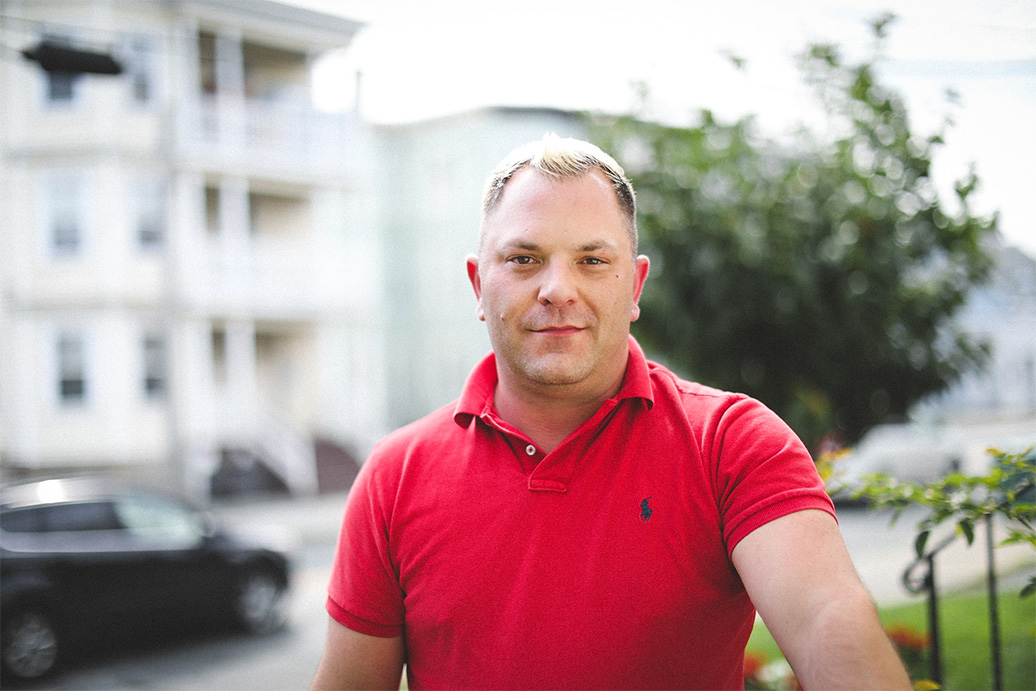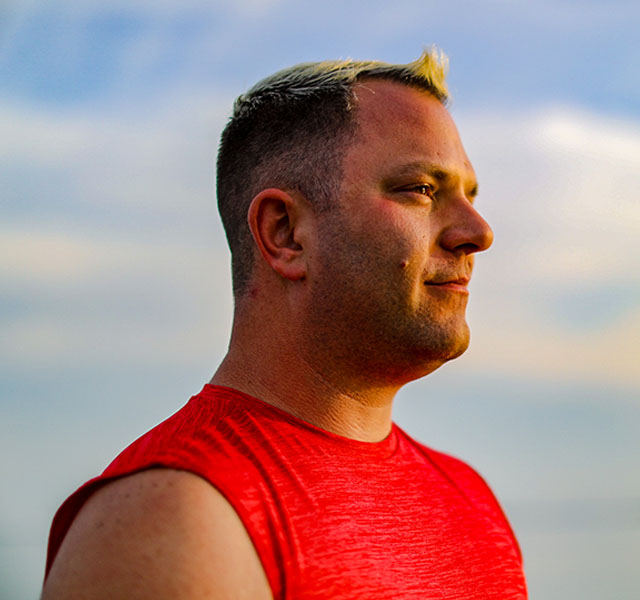MS Stories of Strength
View More Stories
Dan, MS Advocate
Lynn, MA
You have two options after you get a diagnosis: You can deny it or live it. I am choosing to live it. I am living the best I can with this disease.
The salt water runs in between Dan’s toes as he walks along the beach on the Massachusetts north shore, just a few miles from his home. It’s mid-summer, but the water still feels cold, and the sea breeze brings relief from the muggy air. For Dan, the beach and the ocean have always brought respite from the stresses of everyday life. “I enjoy the sound of the waves,” he says, “or just listening to the birds. It provides me peace and tranquility.”
It also fills him with nostalgia. “When I was a child, I loved going to the beach with my family,” he remarks. As a child, the ocean and family were always nearby. “I come from a very close family,” he says. “All my mother’s siblings and their children lived in the same town.” His grandparents would stop by his house almost every day after school. “My grandfather would pick us up at the bus stop and drive us up the hill to our house,” he recalls. The gesture was mostly symbolic, but it would become a defining memory.
For Dan, the tight-knit fabric of family life has been tested by struggles with health, including his own. Dan lives with primary progressive multiple sclerosis (PPMS), an autoimmune disease that destroys the myelin sheath that protects his nerve cells. “My nerves are being destroyed by my own body,” he explains. “That’s what has been causing me issues for all these years.” Despite multiple sclerosis being the most common disease of the central nervous system, the primary progressive type makes up only 10%-15% of all MS cases. For Dan, this means that the loss of balance, coordination, motor skills, pain, and other neurological symptoms are going to increase as he ages, although it is unclear to what extent. This realization has prompted Dan’s quest for acceptance as he comes to terms with his changing physical abilities and an unpredictable future.
“Growing up, I was always the patient,” says Dan. While he was still in utero, his mother worked overnight shifts as an ER nurse. “One night, my mother went to work and told my brother that she would be back in the morning. She didn’t come home the next morning. In fact, she didn’t come home for weeks.” That night, she lost consciousness and was transported to an emergency birth ward. Dan was born eight weeks premature. He was given a 25% chance of survival and was transferred to the neonatal intensive care unit. His older brother, Patrick, had only a single photograph of his baby brother until Dan came home for the first time when he was more than five months old.
Dan first heard the words “multiple sclerosis” at age eight when Karen, a classmate’s mother, came to his elementary school to give a presentation on the disease. “She was in her thirties and used an electric wheelchair,” he remembers. He soon recognized her at his brother’s baseball games, and the two bonded. “I would sit in Karen’s lap, and we would drive the scooter around,” he recalls fondly. “I thought there was nothing wrong with Karen having this motorized chair to get around. I thought it was fun.” Karen would hand the controls over to Dan, whose novice driving skills were an occasional source of danger to both of them. He also learned about some of the struggles that Karen fought as a person living with advanced MS. As natural as this friendship felt, Dan can’t help but look back on it with a tinge of irony. “I never thought I would be the one in my mid-thirties with multiple sclerosis.” After being diagnosed in 2018, Dan wondered if some of Karen’s difficulties would soon become his reality. “The falls, the burns, not being able to take care of her children, not being able to hold her grandchildren—would that be me?”
The Beginning of His MS Journey

The first symptoms of Dan’s PPMS appeared in his early twenties, years before an official diagnosis. No stranger to hard work, Dan studied pharmacy before transitioning to get a degree in business. “I could study for days on end without stopping,” he recalls. However, during his junior year, he first started noticing changes to his energy level. “My attention span was not there anymore, and I couldn’t understand why.” He was puzzled and frustrated but not ready yet to seek professional help.
After college, Dan moved into a walk-up apartment. Despite keeping up an active exercise routine at the gym, he noticed that the stairs to his apartment became increasingly difficult to ascend. Symptoms became harder to ignore about a year later, in 2007, when he developed severe migraines that persisted for days. The pain became so debilitating that he ended up in the ER. The doctors ran a CT scan, MRIs, and performed a spinal tap. Dan waited with hope for the results from all the tests, but they were inconclusive.
Searching for the Right Diagnosis
It would take 12 years for Dan to finally get his diagnosis and the quest was fraught with difficulties. He struggled with what, at times, felt like apathy from medical professionals who were often quick to dismiss his problems or question his observations and intuition. “I did not see eye to eye with my neurologist,” he laments. “I was basically ignored. Nothing was done.”
The turning point in my medical journey was finding a doctor that I related to.
“The turning point in my medical journey was finding a doctor that I related to,” says Dan. His new neurologist began seriously investigating his complaints, referring him to a specialist who diagnosed him with sleep apnea. Utilizing his knowledge in pharmacy science, Dan did much of his own research into what might be going on. “I had narrowed it down to four diagnoses, including demyelinating disease, central nervous system (CNS) vasculitis, neurosarcoidosis, and lupus.” He took these hypotheses to his neurologist, who referred him to a vasculitis expert at the Cleveland Clinic in September of 2018. “That was the best day of my life,” Dan reflects. “She ruled out CNS vasculitis and diagnosed me with a demyelinating disease.” Dan returned to his neurologist with the breakthrough information. After a few weeks filled with numerous examinations and lab work, she made the diagnosis of PPMS with some relapsing components. Getting an answer to the mysterious set of symptoms Dan had experienced was an unparalleled relief. “It was bittersweet,” he says.
However, sharing the news with family was no easy task. “The hardest part was telling people that I have MS,” says Dan. Over the last decade and a half, his family underwent a transformation following an onslaught of catastrophic diagnoses, which exhausted caretaking reserves. First, his aunt, Sally, who lived with type I diabetes, survived a severe heart attack in 2000. Then, his father, John, was diagnosed with and survived skin cancer in 2002. In 2006, his grandparents were both diagnosed with stage IV cancers and died soon after. Next, 2 of his uncles died of cancer in 2012 and 2013; and in 2015, Sally, who had been enduring kidney dialysis for a year, would pass as well. “She was always the one who smoothed things out between everyone,” reflects Dan. He remained an active caretaker along with his parents throughout the series of hospitalizations, hospices, and deaths, but much of the structure of the extended family was fractured. When Dan needed them most, some family members weren’t available to help support him.
I’m finding that there’s joy, there’s happiness, and there’s fulfillment, even though some of the basic functions of life are hindered.
I’m finding that there’s joy, there’s happiness, and there’s fulfillment, even though some of the basic functions of life are hindered.
Taking Action
Dan quickly understood that he alone had the power to change his predicament for the better. The first step was to change his own attitude toward the condition. “When I say ‘multiple sclerosis,’ compared to ‘MS,’ I hear the difference; I hear the scarring as part of the word. When I was diagnosed, I would say the words ‘multiple sclerosis,’ and I would cry. If I said ‘MS’ as initials, I was fine.” The possibility for loss seemed almost infinite—his abilities, his career, his independence all might vanish—but Dan came to understand that PPMS was not like the cancer diagnoses other members of his families had received. “My disease is different,” he states. “Having MS is not a death sentence.”
Next, Dan fought for the best treatments available in conjunction with nutrition, supplements, stretching, strength training, massage therapy, acupuncture, and physical therapy. “Most of all, I had to let myself grieve,” he adds. “I realized it was okay to go through the stages of grief defined by Kubler-Ross: Denial, Anger, Bargaining, Depression [and] Acceptance.”
Similarly, a sort of internal compromise was struck. “You have two options after you get a diagnosis,” says Dan. “You can deny it or live it. I am choosing to live it. I am living the best I can with this disease. I’m finding that there’s joy, there’s happiness, and there’s fulfillment, even though some of the basic functions of life are hindered.” There are inevitably good days and bad days, and Dan is poised to experience both with love and determination.
Finding Joy in the Simple Things

On good days, Dan is able to walk and navigate the world much as he did before, while on bad days, he might not be able to, even with the assistance of a cane. Even driving, one of Dan’s favorite pastimes, became arduous. “Two years ago, I went out and bought my dream car to make me feel better,” he relates. “However, about a year later, I couldn’t drive it easily.” Now, after starting treatment, Dan has been able to drive again, although it depends on the day. Dan works toward accepting this fact while still trying to get out and enjoy his good days. “The excitement the car gives me is freedom,” he says. “There’s something about sitting in a car with the windows down, sunroof open, music on, and picking someplace to go and just driving, that soothes me and fills my soul. There is no better feeling than the wind blowing across your body.” Dan has learned to enjoy life, while coming to terms with the fact that things will never be the same as they once were.
“I can’t climb stairs anymore, but I can still walk through trails in the woods,” he continues. “There are still ways to enjoy what I used [to do] and love doing, but it’s changed. I experience what I love in a different way now.” Simple acts, like walking on the beach, have taken on new meaning, especially now, with a new companion.
Dan’s partner Tarin has a laugh that’s contagious. As he takes Dan’s hand on the beach, Tarin puts Dan instantly at ease. The sun begins to set as the two share the ups and downs of their respective days. They met over twelve years ago, became acquainted as friends, and remained in touch despite being in different parts of the country. Tarin announced that he would be returning to the Boston area in 2019, and the two made plans to meet up. “I figured, I would be home early, and nothing would come from it,” remembers Dan. “The opposite occurred. It felt like we knew each other forever.” Their closeness set the stage for love and opened the doors to a committed relationship.
Despite the challenges that progressive MS has given me, one thing it hasn’t denied me is a life with somebody.
“Despite the challenges that progressive MS has given me, one thing it hasn’t denied me is a life with somebody,” says Dan. Tarin accepts the uncertainties—the potentials for loss—with grace and positivity. “He’s assured me that if I end up in a wheelchair, he will push it for me.” The possibilities start to brighten with Tarin’s assurance and steadfast ability to allay fears. His support has given Dan the gift of stability in an increasingly unstable world. With the sun dipping below the horizon, Dan and Tarin start back to their shared home to make dinner, content together.